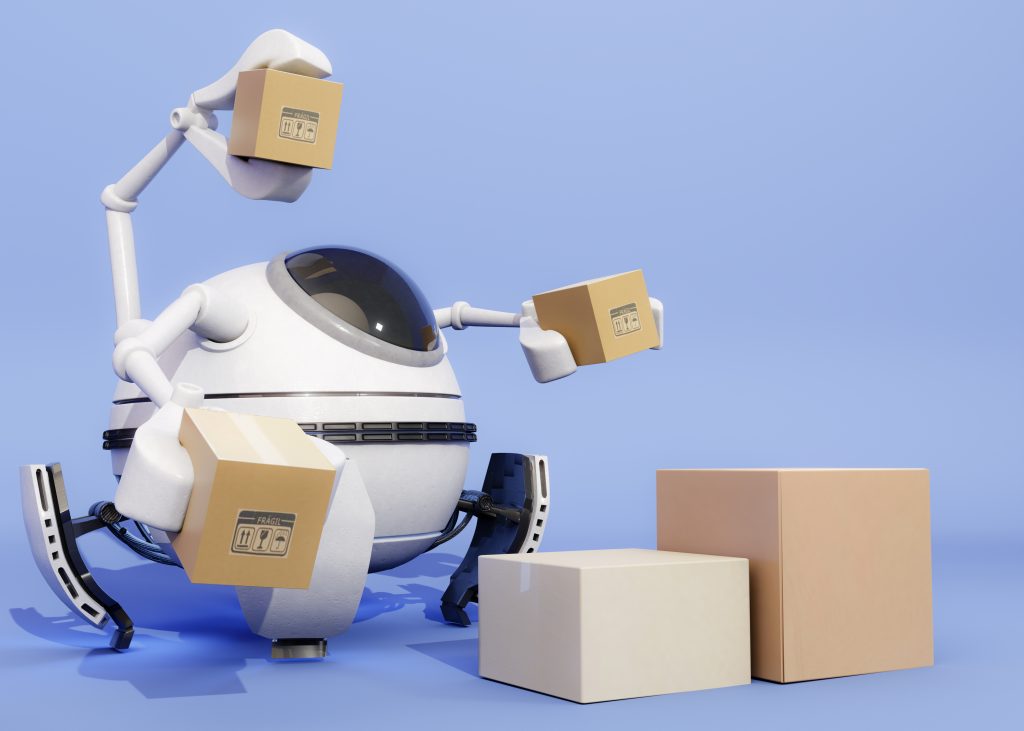Are you ready to navigate the ever-changing landscape of the logistics industry, where artificial intelligence (AI) has emerged as a powerful force? Just like a stealthy navigator steering a ship through uncharted waters, AI is revolutionizing the supply chain and transforming logistics operations. From automating warehouse processes to optimizing transportation routes, AI is making its presence felt. But is it truly taking over? In this discussion, we will unravel the impact of AI on logistics and explore whether it is merely augmenting human capabilities or becoming the captain of the ship. Prepare to embark on a journey where AI and logistics intersect, and discover the potential, challenges, and future prospects of this exciting partnership.
AI in Warehouse Automation
AI-powered robots revolutionize warehouse automation by efficiently sorting, picking, packing, and organizing inventory, resulting in improved order fulfillment speed and reduced reliance on human labor. This integration of AI in warehouse optimization and robotics in warehouse automation has transformed traditional warehouses into efficient distribution centers.
AI-driven sensors, cameras, and RFID tags enable real-time tracking and monitoring of inventory, allowing for better inventory management and reducing losses. With AI for order fulfillment, companies can streamline their operations and meet customer demands more efficiently.
The use of AI in warehouse automation is driven by several factors, including a shortage of workers, union strikes, and increasing labor costs. By implementing AI-driven technologies, companies can overcome these challenges and achieve greater efficiency and productivity.
Real-time tracking in warehouse automation allows for better visibility and control over inventory. This data-driven approach enables companies to make informed decisions and optimize their warehouse operations. With AI-driven inventory management, companies can accurately forecast demand, minimize stockouts, and streamline their supply chain operations.
AI in Transportation
Transportation personnel can enhance their efficiency and handle higher volumes with the valuable assistance and support of AI in the freight industry. AI in transportation has significant future implications, with the potential to revolutionize the way logistics operations are conducted. However, it also brings about several challenges and considerations that need to be addressed:
- Impact on job roles: The integration of AI in transportation may lead to changes in job roles and responsibilities. While AI can augment human intelligence and improve job satisfaction, there is a possibility of certain tasks becoming automated, potentially impacting employment opportunities.
- Ethical considerations: As AI becomes more prevalent in transportation, ethical issues such as privacy and transparency arise. It is essential to ensure that AI systems are designed and implemented in an ethical manner, with proper safeguards in place to protect sensitive information.
- Cybersecurity risks: The increased reliance on AI in transportation introduces cybersecurity risks. It is crucial to implement robust security measures to protect AI systems from unauthorized access, data breaches, and potential cyber-attacks.
- Integration challenges: Integrating AI into existing transportation systems can be complex. It requires seamless integration with legacy systems and the management of diverse data sources. Overcoming these integration challenges is essential for the successful implementation of AI in transportation.
As AI continues to advance and transform the transportation industry, careful consideration of these implications, along with proactive measures, will be crucial for maximizing the benefits while mitigating potential risks.
AI in Predictive Analytics
With the integration of AI in transportation paving the way for increased efficiency and higher volumes, the focus now shifts to the subtopic of AI in predictive analytics, a key area where AI’s capabilities can revolutionize the logistics industry. Improving forecasting is a critical aspect of logistics operations, and AI can play a significant role in this area. By analyzing vast amounts of historical and real-time data, AI algorithms can generate accurate predictions for demand patterns, inventory fluctuations, and potential disruptions. This enables logistics companies to optimize inventory levels, minimize stockouts, and streamline supply chain operations.
Furthermore, AI’s data-driven decision-making capabilities enhance supply chain operations by providing valuable insights and recommendations. AI algorithms can analyze complex data sets to identify patterns, trends, and correlations, enabling logistics professionals to make informed and strategic decisions. This not only improves operational efficiency but also enables companies to anticipate disruptions and take proactive measures to mitigate their impact.
Another area where AI excels is optimizing inventory levels. By leveraging predictive analytics, AI algorithms can analyze historical data, current market trends, and other relevant factors to determine the optimal inventory levels for different products. This ensures that the right products are available at the right place and time, reducing costs associated with excess inventory or stockouts.
Challenges in AI Adoption
One of the key challenges in the adoption of AI in logistics is the lack of digital maturity, the right talent, and the necessary mindset to fully leverage its potential. To understand the depth of this challenge, consider the following points:
- Digital Maturity: Many companies in the logistics industry are still in the early stages of their digital transformation journey. They lack the infrastructure, systems, and processes to effectively integrate AI technologies into their operations.
- Talent Shortage: The shortage of skilled professionals who understand AI and its applications in logistics is a significant hurdle. Finding and retaining talent with the right expertise in AI algorithms, machine learning, and data analytics is crucial to successfully adopt and implement AI solutions.
- Mindset Shift: Embracing AI requires a fundamental shift in mindset from traditional ways of doing business to a more data-driven approach. Companies must be willing to move away from looking backward and instead focus on real-time insights and predictive analytics to drive decision-making.
- Trust in Data: Trust is crucial when it comes to making instantaneous decisions based on AI-generated insights. Companies need to have confidence in the accuracy and reliability of the data being used to inform their operations and strategies.
Overcoming these challenges will require a concerted effort from companies to invest in digital infrastructure, attract and develop AI talent, foster a culture of innovation, and prioritize data quality and trust. Only then can the full potential of AI in logistics be realized.
Warehouse Automation and Robotics
The adoption of AI in logistics faces various challenges, but one area where it has shown significant potential is in warehouse automation and robotics. AI-powered robots have revolutionized warehouse operations by efficiently sorting, picking, packing, and organizing inventory. This automation has led to efficiency benefits such as improved order fulfillment speed, reduced labor costs, and enhanced inventory management. AI-driven sensors, cameras, and RFID tags enable real-time tracking and monitoring of inventory, allowing for better visibility and control over stock levels.
Warehouse automation powered by AI has become necessary due to labor shortages and rising labor costs. With a shortage of workers and union strikes becoming more prevalent, companies are turning to AI to streamline their operations and reduce dependency on human labor. By implementing AI in warehouse automation, companies can overcome labor shortages and improve productivity.
Moreover, AI in warehouse automation has proven to be cost-effective. By reducing the need for human labor, companies can significantly cut down on labor costs. Additionally, real-time tracking and inventory management provided by AI allow for better utilization of warehouse space, minimizing losses and maximizing operational efficiency.
Transportation and AI
AI plays a valuable role in the transportation industry, providing assistance and support to personnel in handling increased volume and improving efficiency. By applying AI in transportation operations, companies can unlock a range of benefits and capabilities. Here are two key aspects of AI in transportation:
- Augmented Intelligence in Transportation:
- AI, or Augmented Intelligence, helps transportation personnel be more efficient and handle more volume.
- AI in transportation improves job satisfaction and helps with talent attraction and retention.
- Predictive Capabilities of AI in Supply Chain Visibility:
- AI’s predictive capabilities empower companies to anticipate potential risks and devise contingency plans.
- Visibility platforms like project44 and Mojix aid in inventory tracking, enhancing supply chain visibility.
With AI’s assistance, transportation personnel can handle higher volumes of shipments, leading to improved efficiency and customer satisfaction. AI also enhances job satisfaction by reducing repetitive tasks and allowing employees to focus on more strategic and complex responsibilities. Additionally, AI-enabled predictive analytics provide companies with real-time visibility into their supply chain, allowing them to proactively address any disruptions or risks. By leveraging AI in transportation, companies can optimize their operations, improve customer service, and drive overall business success.
Visibility and AI
Visibility plays a crucial role in the supply chain, and when combined with AI, it empowers companies to proactively anticipate potential risks and make informed decisions. AI enables real-time tracking, improving data quality, and enhancing predictive capabilities. By leveraging AI, companies can achieve transparent communication and collaboration, enhancing the resilience and agility of the supply chain. Collaborative efforts between stakeholders become more effective, as real-time visibility enables quick response to potential disruptions.
Predictive Analytics in Logistics
Predictive analytics in logistics revolutionizes supply chain operations by leveraging AI-powered systems to anticipate demand patterns, optimize inventory levels, and streamline supply chain processes. With the application of predictive analytics in logistics, you can experience the following benefits:
- Predictive analytics applications: AI-powered systems utilize historical data and advanced algorithms to predict future demand patterns and optimize supply chain operations.
- Data-driven optimization: By analyzing large volumes of data, AI systems can identify areas for optimization and make data-driven recommendations for improving efficiency.
- Demand forecasting accuracy: Predictive analytics algorithms can analyze historical sales data, market trends, and external factors to accurately forecast demand, ensuring the right products are available at the right time and place.
- Supply chain disruption detection: AI-powered systems can monitor real-time data from various sources to detect potential disruptions in the supply chain, allowing for proactive measures to minimize their impact.
- Real-time inventory management: By continuously analyzing data on inventory levels, sales, and customer behavior, AI systems can optimize inventory levels in real time, reducing costs and preventing stockouts.
With the rapid growth of data and advancements in computing power, predictive analytics in logistics will continue to evolve, eventually leading to prescriptive analytics that can automate larger parts of workflows. By embracing AI and predictive analytics, companies can gain a competitive edge in the ever-changing logistics landscape.



